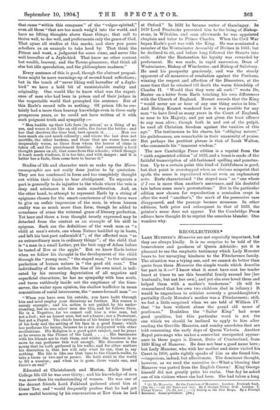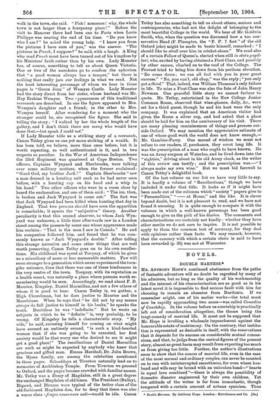LADY MUNSTER'S Memories are not especially important, but they are
always kindly. It is no surprise to be told of the benevolence and goodness of Queen Adelaide; yet it is pleasant to see the emphatic testimony which Lady Munster bears to her unvarying kindness to the Fitzclarence family. The situation was a trying one, and we cannot do better than quote from these Memories the simple words which describe her part in it :—" I know what it must have cost her tender heart at times to see this beautiful family around her [her husband's* but not her own], and yet she ever loved them and helped them with a mother's tenderness." (It will be remembered that her own two children died in infancy.) It would be ungracious to criticise severely a granddaughter's partiality (Lady Munster's mother was a Fitzclarence) ; still, we feel a little surprised when we are told of William IV. that "he bore without abuse the grand old name of gentleman." Doubtless the "Sailor King" had some good qualities, but this particular word is not the one which we should be inclined to apply to him after reading the Greville Memoirs, and sundry anecdotes that are told concerning the early days of Queen Victoria. Another Royal personage who makes a somewhat unexpected appear- ance in these pages is Ernest, Duke of Cumberland, from 1830 King of Hanover. He does not bear a good name here ; but Lady Munster, who with her mother and sister visited his Court in 1850, quite rightly speaks of him as she found him, —imperious, indeed, but affectionate. The dominant thought, however, as we read the narrative is—What a blessing that Hanover was parted from the English Crown ! King George himself did not greatly prize his realm. One day he asked one of his visitors where she had been. She had taken a long
• (1) 31y Memories. By the Countess of Munster. London Eveleigh Nash. [12s. tid.] —(2) Old Times and New. By J. George Tetley. D.D. London : T. Fisher UliWill. [7s. 6d. net.]—(3) Society in the New Neigh. By a Foreign Resident. Same publisher. [162.3
walk in the town, she said. " Pish ! nonsense ! why, the whole town is not larger than a fourpenny piece !" Before the visit to Hanover there had been one to Paris when Louis Philippe was nearing the end of his time. "Do you know who I am ?" he asked the young lady. "I know you from the pictures I have seen of you," was the answer. "The pictures in Punch, I suppose?" he said, with a laugh. A King who read Punch must have been turned out of his kingdom by his Ministers' fault rather than by his own. Lady Munster has, of course, something to tell us about Queen Victoria. One or two of the anecdotes go to confirm the aphorism that "a good woman always has a temper," but there is nothing that really jars our feelings in what we read. Not the least interesting personage of whom we hear in these pages is "Green Jean" of Wemyss Castle. Lady Munster had the story direct from her sister, whose husband was Mr.
Hay Erskine Wemyss. Two rppearances of this traditional rerenante are described. In one the figure appeared to Mrs.
Wemyss's daughter and a friend; in the other to Mrs.
Wemyss herself. After wondering for a moment who the stranger could be, she recognised the figure. She said in
telling the story : "I walked by her the whole length of the gallery, and I don't think there are many who would have done that,—but speak I could not."
If Lady Munster tells us a striking story of a revenante, Canon Tetley gives us one yet more striking of a wraith. It has been told, we believe, more than once before, but it is worth repeating, so well authenticated is it, and in two respects so peculiar. In the War of American Independence the 33rd Regiment was quartered at Cape Breton. Two officers, Captains Wynyard and Sherbrooke, were talking over some military matters, when the former exclaimed : "Good God, my brother Jack ! " Captain Sherbrooke "saw a man dressed in a hunting suit such as he had never seen before, with a hunting cap on his head and a whip in his hand." Two other officers who were in a room close by heard the exclamation, and one of them said : "The ice, then, is broken and Jack Wynyard is come out." The fact was that Jack Wynyard had been killed when hunting that day in England. That two persons should have seen the apparition is remarkable; it upsets the " subjective " theory. Another peculiarity is that this second observer, to whom Jack Wyn- yard was unknown, a little time afterwards saw in a London street among the passers-by some one whose appearance made him exclaim : "That is the man I saw in Canada." He and his companion followed him, and found that he was com- monly known as "Jack Wynyard's double." After telling this strange narrative and some other things that are well worth preserving, Canon Tetley goes on to his own recollec- tions. His childhood was spent at Torquay, of which he gives us a miscellany of more or less memorable matters. Few will seem stranger to a generation which never experienced the turn- pike nuisance, than that there was one of these hindrances in the very centre of the town. Torquay, with its reputation as
a health resort, was naturally a place where persons worth re- membering would be seen. Accordingly, we read about F. D.
Maurice, Kingsley, Daniel Macmillan, and not a few others of -whom it is good to hear. Canon Tetley is, we gather, a High Churchman, but he does justice to Maurice and the Mauricians. When he says that "he did not by any means always do full justice to himself in his books," he speaks the truth. Doubtless he was "indefinite." But he wrote on subjects in which to be " definite " is, very probably, to be wrong. Of Kingsley he tells a characteristic story. "My wife," he said, excusing himself for coming on what might have seemed an untimely errand, "is such a kind-hearted woman that if she was going to be executed, her first anxiety would be that every one who desired to see it might get a good place!" The recollections of Daniel Macmillan are such as might be expected by anybody who knew that gracious and gifted man. Emma Marshall, Dr. John Brown,
the Myers family, are among the celebrities mentioned in these pages. Schooldays at Tiverton naturally lead on to memories of Archbishop Temple. From Tiverton we proceed to Oxford, and the pages become crowded with familiar names. Mr. Tetley was a Demy of Magdalen, still in a great degree the unchanged Magdalen of old times. The President (Bailey), Rigaud, and Bloxam were typical of the better class of the old-fashioned Magdalen don, for to deny that there was also a worse class –fruges consumere nati—would be idle. Canon Tetley has also something to tell us about others, seniors and contemporaries, who had not the delight of belonging to the most beautiful College in the world. We hear of Mr. Goldwin Smith, who, when the question was discussed how a too con- servative Head (F. Plumptre, the "F. P. 7 feet" of the old Oxford joke) might be made to bestir himself, remarked : "I should like to stroll over him in cricket-shoes." We read also of a certain Fellow of Queen's, elected when still in statu pupil- lari, who, excited by having obtained a First Class, and possibly by other causes, -climbed on to the roof of the College. The Provost tried to bring him down from his perilous elevation. "Do come down ; we can all feel with you in your great success." "No, you can't, old chap," was the reply ; "you only got a third." That, indeed, was William Thomson's only failure in life. To miss a First Class was also the fate of John Henry Newman. One graceful little story we cannot forbear to quote. Mr. Tetley, entertained in the New College Junior Common Room, observed that wine-glasses, doily, &c., were set for a third guest, though he and his host were the only company. It was explained that an American visitor had given the Room a silver cup, and had asked that a place should be laid for him on the anniversary of his visit. There are many pleasing reminiscences of things and persons out- side Oxford. We may mention the appreciative estimate of one of whose good work the world does not know enough,— Mr. Gambier-Parry. One morsel of wisdom we must not refuse to our readers, if, perchance, they covet long life. It was the prescription of a man who ought to have known. He was an Army surgeon at Waterloo, and he lived down into the "eighties," driving about in his old Army cloak, as the writer of this review can testify ; and the prescription was :—" I always make my own wine." But we must bid farewell to Canon Tetley's delightful book.
Of the last volume on our list we have very little to say. It is hardly a volume of "Recollections," though we have included it under that title. It looks as if it might have been made out of the columns which " society " papers give to "Personalities," " — at Home," and the like. It is clever beyond doubt, but it is not pleasant to read, and we have not found it amusing. It is quite enough to compare it with the volumes in which a well-known personage has been good enough to give us the pick of his diaries. The comments and characterisations are certainly not kindly : whether they have other merits we do not care to inquire. It is not possible to apply to them the common test of accuracy, for they deal with opinions rather than facts. We may remark, however, that the canonry with which a certain cleric is said to have been rewarded (p. 38) was not at Worcester.



































 Previous page
Previous page